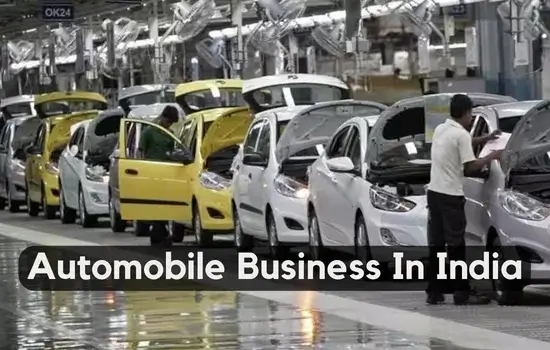India has one of the biggest car industries globally, with companies making cars, bikes, scooters, and commercial vehicles. This industry is vital for the country, creating jobs and adding to the money it makes.
The car sector is growing fast, thanks to India’s booming economy and better technology. It’s like a treasure chest of opportunities, providing many jobs and helping the economy. Here are some excellent automobile business ideas in India that you can consider to start your own business and do well. Let’s start with how to start your automobile business in India.
What are the types of automobile businesses in India?
In India, auto business includes making, selling, and servicing vehicles. Making cars or their parts is in demand in and outside the country. Selling finished cars and parts is the most common and profitable. Big brands like Tata Motors and Mahindra Mahindra sell directly to customers.
Exporting vehicles, especially two-wheelers, brings in big profits. In 2021, India exported over three million two-wheelers worldwide. Besides individuals, cars are used by transport agencies, rental services (like Ola and Uber), freight companies, and e-commerce delivery services.
Various services operate in the Indian auto market, including repairs, servicing, cleaning, towing, brokerage, and insurance agencies. These services help vehicle owners with licenses, certificates, approvals, and registrations for safety and rules compliance.
How To Start an Automobile Business In India
- Plan and strategize: To start a new business in the car industry, plan carefully. Create a detailed, flexible, and future-proof business plan. This ensures you’re ready to tackle challenges as they come.
- Choose your Industry: After planning, choose your focus in the automobile industry. Select single or multiple options based on your knowledge and experience: research competition, demand, and growth rates in the industry. Consider factors like investors, overall costs, and your target buyers before starting your business.
- Choose your location: When picking a location for your car business, ensure it’s close, accessible, and affordable. Consider supply chain convenience, low property and rental costs, affordable transportation, a large local market of potential buyers, expansion opportunities, and safety and sanitation of the area.
- Choose your mode of operation: Automobile businesses, whether selling goods or services, typically operate offline. This mode is not only preferred by buyers but is also the only option for sellers and service providers in some cases.
- Choose your name, logo, and brand: Pick a name for your auto business that conveys your operations and brand identity. For example, Tata Motors and Hyundai Motor Company include “Motors” or “Motor Company” in their names, indicating their field.
Ensure your business name and logo don’t copy existing ones, per the Trademark Act,1999. Register your business name and logo to prevent others from using them. Many companies offer expert help with trademark registration for new companies.
- Get registered and incorporated: After determining your business’s legal status, start registering and incorporating it.
- Get insurance: Get essential insurance coverage for your business, property, and products to ensure safety and cover losses. Businesses like car rentals, delivery services, and transportation need vehicle and commercial vehicle insurance.
- Hire staff: In the automobile industry, skilled and experienced employees are crucial, even though they may increase labor costs. This investment boosts long-term productivity.
- Build a marketing team and channel: Create a marketing team and channels. Online marketing is essential, and many automotive businesses also advertise in print media and on television to promote their products.
- Build a customer grievance and feedback system: Establish a customer feedback system. Regular customer input provides insights into their needs, helping you enhance product quality and competitiveness without additional market research.
- Organize a grand launching for your business: Invite potential customers, industry leaders, competitors, and suppliers to promote your new business.
Conclusion
Thriving in the automobile industry means understanding and meeting customers’ changing needs and desires. Adapting your products to current market trends is crucial for success. An example is the Electric Vehicle Segment, where substantial investments from both public and private sectors indicate its growing importance and potential business opportunities.















